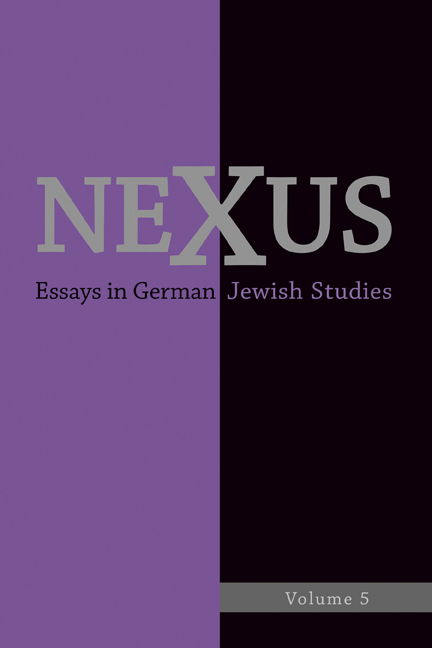 Nexus: Essays in German Jewish Studies, Volume 5
Nexus: Essays in German Jewish Studies, Volume 5 Book contents
- Frontmatter
- Dedication
- Contents
- Miscellaneous Frontmatter
- Introduction: Moments of Enlightenment for Jews and Other Germans
- Remembering Jonathan
- Jonathan M. Hess: Curriculum Vitae
- Maurice Sendak’s Dear Mili: A Contrapuntal Elegy
- Pluralism and the Modernized Jesus in Mendelssohn, Schiller, and Schleiermacher
- The Papal Game: Telling a Jewish Story from the Mayse bukh, Ayzik Meyer Dik and Marcus Lehmann
- The Fuzziness of Jewish and Non-Jewish Boundaries in Viennese Popular Culture around 1900: A Trend Toward “Similarity”?
- Freeing the Shtetl from the Ghetto Prism: Sholem Asch and Dovid Bergelson in German Translation
- A Poetics of Genocide: The Jewish Dead Confront the Germans in Katzenelson’s Warsaw Ghetto Poem “Vey dir”
- Appendix: “Vey dir”
- The New Ostjude and the Enlightened Ostdeutschen: Jewish Theater in the German Democratic Republic
- German Jewish lengevitch: A Plurilingual Poetics of Meddling
Appendix: “Vey dir”
Published online by Cambridge University Press: 24 March 2021
- Frontmatter
- Dedication
- Contents
- Miscellaneous Frontmatter
- Introduction: Moments of Enlightenment for Jews and Other Germans
- Remembering Jonathan
- Jonathan M. Hess: Curriculum Vitae
- Maurice Sendak’s Dear Mili: A Contrapuntal Elegy
- Pluralism and the Modernized Jesus in Mendelssohn, Schiller, and Schleiermacher
- The Papal Game: Telling a Jewish Story from the Mayse bukh, Ayzik Meyer Dik and Marcus Lehmann
- The Fuzziness of Jewish and Non-Jewish Boundaries in Viennese Popular Culture around 1900: A Trend Toward “Similarity”?
- Freeing the Shtetl from the Ghetto Prism: Sholem Asch and Dovid Bergelson in German Translation
- A Poetics of Genocide: The Jewish Dead Confront the Germans in Katzenelson’s Warsaw Ghetto Poem “Vey dir”
- Appendix: “Vey dir”
- The New Ostjude and the Enlightened Ostdeutschen: Jewish Theater in the German Democratic Republic
- German Jewish lengevitch: A Plurilingual Poetics of Meddling
Summary
Vey dir
Yitzkhok Katzenelson
Woe to You
Yitzkhok Katzenelson
Woe to You
Woe to you, who have murdered all my children
and all my old ones, the oldest of my people.
I tell you, nation of murderers, children are never lost,
the aged never die before their time.
Woe to you, who have entirely exterminated my peaceful people,
burned down my houses of worship,
all my shuls together with the Jews in them,
and my holy Jewish cities.
Woe to you, who have destroyed an unarmed people,
who have destroyed a people unprotected by anyone.
I tell you, those who were unprotected will punish you:
you will be judged by the people without weapons!
Woe to you, nation of child-killers, murderers of the old,
who have annihilated my children and my old ones.
I tell you, murdered old people cannot be hidden,
murdered children heave from the grave as from their mother's womb.
I tell you, innocent murdered Jews do not die,
a people is not destroyed without reason.
I tell you, nation of murderers, Jerusalem cannot be laid waste,
Shoot! Shoot into my heart … that is your last shot!
Woe to you, your evil hour—listen—has struck,
soon, soon, a plague on you and you’re finished:
We’ll pursue you on every road,
we’ll burst out of our graves.
With wife and child, with grandpa and grandma,
those shot by you for no reason,
the people you buried alive,
we shall stand up and bleakly stare at you.
We shall stand up on every single road,
silent, silent, silent as the grass;
mutely we’ll stand and mutely we’ll ask,
why have you murdered us, why?
Bloody, unclean, you’ll run away
and a savage terror will seize you:
we, the dead, will head you off on every road,
we’ll block you on every path.
We, the slain, will stand up and stare at you,
stare at you mutely in our anguish,
and, staring at you, devour you in silence:
we’ll cling to your very bones.
- Type
- Chapter
- Information
- Nexus: Essays in German Jewish Studies, Volume 5Moments of Enlightenment: In Memory of Jonathan M. Hess, pp. 165 - 178Publisher: Boydell & BrewerPrint publication year: 2021
